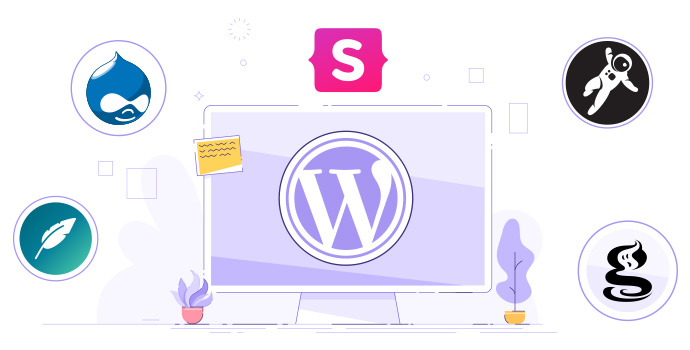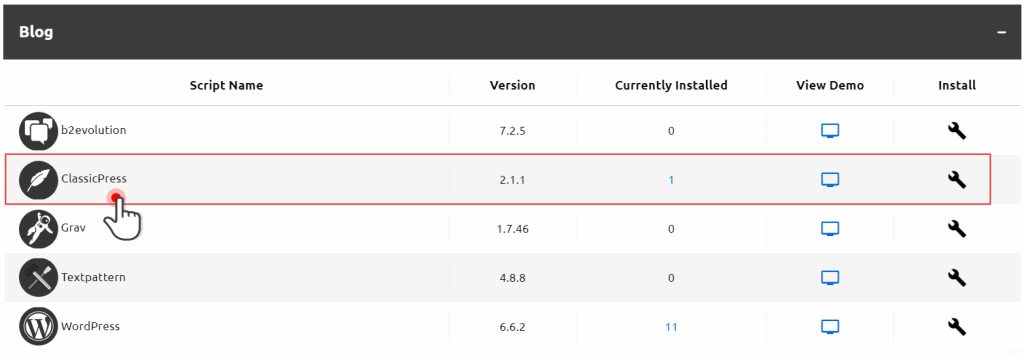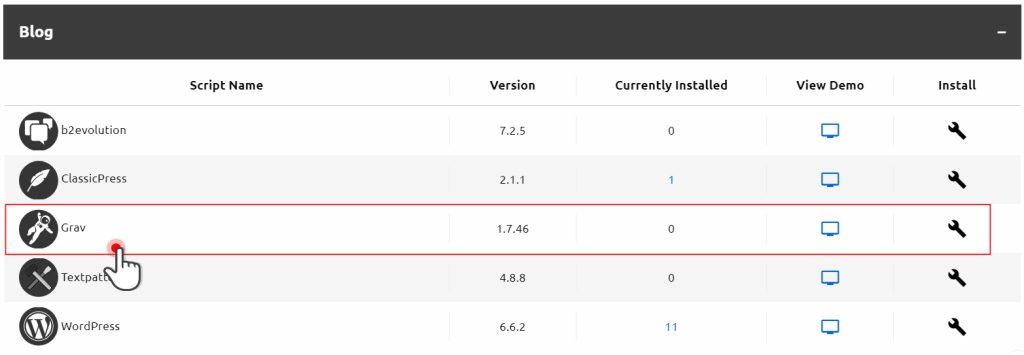WordPress community shake-up: 5 WordPress alternatives to you may need to consider at times of uncertainty

Have you heard about the recent shake-up involving WordPress – the popular open-source platform that runs more than 40% of websites?
WordPress co-founder – Matt Mullenweg, has kicked off a loud dispute with the web hosting provider WP Engine that’s been making waves online for a while now.
Could this mark the end of a long-standing, peaceful relationship between open-source and business?
No matter what happens, this clash serves as a wake-up call for WordPress users to start looking into other options in case things take a turn for the worse.
In this post, we’ll take a look at five excellent WordPress alternatives that may have remained unnoticed by you so far due to WordPress’s hegemony on the market.
Each platform provides distinct features suited to different user needs, from tech-savvy coders to content makers looking for simplicity.
But before we dig in, let’s briefly explore the background that led us to seek WordPress alternatives:
What is the WordPress drama about?
A key element in the whole saga was Matt Mullenweg’s Word Camp US 2024 presentation. He criticized WP Engine’s private equity owners for not supporting the WordPress community and for profiting from trademark confusion.
Soon after, he criticized the company for turning off post-revision history, saying it was a data security risk.
This then quickly escalated into WP Engine being banned from WordPress.org resources, disrupting plugin and theme updates for millions of websites, thus exposing them to security risks.
WP Engine in turn accused Mullenweg of misusing his control over WordPress to interfere with their customers and the ecosystem.
Mullenweg clarified the dispute was solely about trademarks, mentioning failed attempts at a licensing deal.
In response, WP Engine updated its footer to clarify its non-affiliation with WordPress and renamed products to exclude “WordPress.”
On October 1, WP Engine announced deploying its own solution for updating plugins and themes.
Shortly after, the open-source WordPress.org project, also under Mullenweg’s leadership, took control of WP Engine’s ACF (Advanced Custom Fields) plugin in order “to remove commercial upsells and fix a security problem.
WordPress.org users of ACF received an “upgrade” that shifted them to a Secure Custom Fields plugin managed by WordPress.
This action sparked alarm throughout the community, prompting numerous well-known WordPress plugin developers to remove their plugins from wordpress.org and offer them exclusively through their own websites.
No matter how this situation unfolds, it’s evident that employing the WordPress mark for business or service branding could become risky, potentially impacting numerous service providers, and their customers.
So, now is the time to look around for alternative solutions on the market and prepare for possible disruptions related to open-source solutions and the hosting industry.
What are the WordPress alternatives worth considering?
Here are some CMS options to consider as alternatives to WordPress:
1. Drupal
If you need a platform with advanced flexibility and customization, Drupal is worth considering. Its reputation for strong security and scalability is well-deserved.
This makes it ideal for larger websites, particularly those managing complex information or high visitor numbers. Many of the world’s most prominent websites, including educational institutions, government sites, and media sites, rely on Drupal.
Why Choose Drupal:
- High Customization: Drupal allows developers to create uniquely tailored websites with more control over structure and functionality compared to WordPress;
- Robust Security: Known for its strong security measures, Drupal is perfect for industries handling sensitive information;
- Scalability: It’s an excellent pick for websites aiming to expand without compromising speed or efficiency;
Target audience: Tech-savvy users, developers, and companies seeking a customized platform with top-notch security.
Platform accessibility: Drupal is included in the Web Applications Installer, allowing both you and your clients to easily set it up with a single click from the Web Hosting Control Panel.
2. ClassicPress
Remember the pre-Gutenberg WordPress? Miss the classic editor? Check out ClassicPress, a WordPress offshoot that keeps the old-school interface. It’s perfect for folks who like the straightforward features of traditional WordPress, without the bells and whistles of the block editor.
Why Choose ClassicPress:
- Ease of Use: If you’re used to WordPress, ClassicPress feels like home. It’s nearly identical to older versions, making switching a breeze;
- Stability: It aims to provide a reliable platform without the constant updates common in WordPress;
- Speed: By cutting out some newer features you might not need, ClassicPress can make your website run faster and smoother.
Target audience: People who prefer the old-school WordPress without the new block editor, or those running sites that don’t need constant updates.
Platform accessibility: ClassicPress has recently joined the Web Applications Installer, enabling you and your customers to effortlessly install it with one click from the Web Hosting Control Panel.

3. Grav
Looking for a lightweight, flexible, and fast solution? Grav could be the perfect alternative. As a flat-file CMS, Grav operates without a database, making it super quick and easy to manage. It’s perfect for those wanting a sleek, efficient site without unnecessary extras.
Why Choose Grav:
- Performance: Grav’s database-free structure enables swift loading and enhanced efficiency, particularly for compact websites or blogs;
- Simplicity: For those seeking a sleek, effective content management system that doesn’t slow down your site, Grav stands out as an ideal option;
- Customization: Grav provides powerful theming and plugin capabilities, making it flexible for a wide range of projects.
Target audience: Developers and tech-savvy users who prioritize speed and simplicity, or those looking to build blogs, portfolios, or smaller websites.
Platform accessibility: Grav can now be installed with a single click using the Web Applications Installer in your Web Hosting Control Panel.

4. Ghost
Looking for a WordPress alternative for content-focused sites? Try Ghost. It’s designed for writers and publishers, emphasizing speed and ease of use. As a headless CMS, it separates content creation from delivery, making it ideal for bloggers and publications.
Why Choose Ghost:
- Optimized for Publishing: Ghost is tailored for writers and publishers, making it ideal for blogs, online magazines, and newsletter production;
- Speed and Performance: Ghost is extremely lightweight and fast, with an emphasis on clean, minimal design;
- Headless CMS: Developers can leverage Ghost’s API to distribute content across various platforms, offering flexibility in front-end design.
Who it’s for: Content creators, bloggers, and media outlets seeking a straightforward, powerful platform centered on content creation and delivery.
Platform accessibility: Ghost isn’t included in the Web Applications Installer, but you can use it on our platform through SSH. See our step-by-step guide for installing Ghost.
5. Statamic
Statamic is another user-friendly, database-free CMS designed for managing both static and dynamic content effortlessly. Even though it operates on a flat-file structure, it provides a control panel that closely resembles that of WordPress. This feature makes it an excellent choice for individuals who lack coding skills or technical expertise.
Why Choose Statamic:
- Dynamic Content without a Database: Statamic offers dynamic functionality for content handling without database dependency, allowing for easy and efficient management;
- User-Friendly Interface: Its streamlined, straightforward control panel enables teams to handle content effortlessly, regardless of technical background.
- Cutting-Edge Features: Built on contemporary technology, Statamic continuously updates with new tools and integrations to stay current.
Target audience: Content professionals, marketing teams, and organizations seeking the advantages of a file-based CMS combined with an accessible interface and up-to-date features.
Platform accessibility: Statamic is not included in our Web Applications Installer, but you can access it through SSH just like Ghost.
Finding the right CMS for your needs
With recent WordPress changes, it’s wise to plan for possible open source and business impacts. Looking into WordPress alternatives for you or clients can protect against potential downsides of this situation.
Each system has distinct advantages for different uses. Offering personalization choices, fast loading, and user-friendly layouts, these content platforms provide solid options.
If you’re considering a WordPress substitute, we recommend trying them out – they’re free to set up and test. With our 1-click installs, you can have most of them ready to use in less time than it takes to enjoy a quick snack.
On our side, we’ve ensured that whichever option you select, your website will perform flawlessly.
Originally published Thursday, October 24th, 2024 at 2:35 pm, updated October 24, 2024 and is filed under Web Hosting Platform.Tags: wordpress, hosting reseller, web applications installer



Leave a Reply